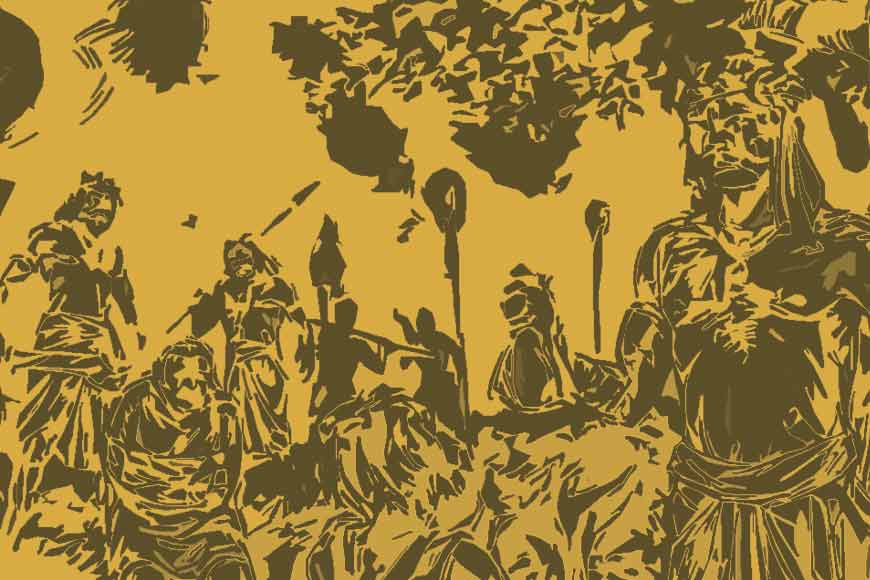Raghu Dakat – why did a peasant’s son take up arms

In this 3-part series GB explores the tales of famous dacoits of Bengal in the 18th and 19th centuries, who were cult figures like Robin Hood! From Raghu, Bishe, Rana, Bede to Bhabani Pathak, the list is endless. But why did they take up banditry? Was it poverty or English indigo planters and their torture that forced them to turn dacoits? This part talks about the exploits of famous Raghu Dakat and how he was a terror to the rich Babus of Bengal.
As Raghu’s father was killed brutally by the indigo planters, the teenager Raghu seethed in anger. He was a brilliant ‘lathiyal’ (a traditional Bengali martial arts with bamboo sticks) and he was ready to get even with the corrupt officials and landlords who had money and power and wielded their weapons on innocent, poor people. He decided to form a gang and encouraged local youths to join him. Many did so willingly because they found in him a brave and honest man who would fight for their rights and rectify all instances of injustice perpetrated on them. Raghu shared all the spoils from his mission with poor villagers and received unconditional support and blessings from the masses. Ordinary people shielded him from the police and he always remained an elusive entity for the lawmakers.
Stories of Raghu’s daring exploits galore. There is a well-known lore about a nouveau riche Bengali named Madhub Babu. He was a very wealthy man who had built several mansions in Calcutta. In fact, to do him honor, the City Fathers had named a tank after him. Madhub Babu had a fine ‘Bagan-bari’ (country house) in Chandernagore, where he frequently entertained his friends. On one such occasion, he along with his friends were idly discussing Raghu dacoit’s adventures. Madhub Babu confidently bragged that his house was so well guarded that Raghu and his men would never dare to attack it. One of his guests warned him saying Raghu Dacoit was a dangerous and clever man.
A few days later, Madhub Babu received a letter from the infamous outlaw informing him that he would be pleased to visit the rich man's country house. Madhub Babu was shocked at the audacity of Raghu and wondered how his stray remark reached the robber. He immediately sought help from the police force in Calcutta and offered to cover all expenses for a strong police team to guard his country house. The team arrived, and his country residence remained under strict surveillance for a couple of months, but nothing happened during that phase! Madhub Babu concluded the letter was a hoax and the police guard was withdrawn.
Madhub Babu's Chandernagore house stood on the bank of Ganga River. One dark night on a new moon day, a small dinghy boat approached the bank and anchored quietly near the ghat. The occupants descended deftly from the boat and proceeded stealthily with measured steps to the house. The house was locked and all the doors and windows were fastened securely. But this was no impediment for Raghu and his team members. The house was surrounded by tall trees and many grew close to the house. Climbing the nearest, some of the bandits reached up a long and stout bamboo plant and from there jumped on the flat roof. A slim youth crawled over and fixed the other end securely. Then one by one, a group of the gang members slid across. The door of the staircase leading down to the house stood open. Creeping like cats downstairs, they entered the porch. The guards on duty there lay fast asleep. The light of their lanterns showed their swords hanging on the wall. In a trice, the dacoits had them down, unsheathed, and decimated the guards mercilessly with their own weapons.
The men then opened the door to let in the other members of the band in the house. The next few hours were chaotic and confusion and dismay reigned while the burglars inspected each room and collected Madhub Babu's treasures en masse. After the house was stripped of all valuables, the men disappeared in the darkness like apparitions. The story does not end there. While still smarting under the loss of his valuables, Babu received another letter from Raghu Dacoit asking if his visit had given Madhub Babu pleasure.
Raghu Ghosh’s place of origin is mired in mystery and historians have not been able to specify the place. Hooghly, Burdwan, Nadia, Barasat, 24 Parganas, Howrah, Murshidabad, and even Calcutta were infested with numerous robbers. Landlords and ordinary people were weary of their daring exploits. The British government decided to handle this crisis with alacrity. The East India Company established the ‘Thuggee and Dacoity Department’ in 1830 and a separate anti-burglar department was set up in each police station. A red alert was issued at the police stations to arrest all dacoits. The bandits were forced to go underground and change locations frequently to abate imprisonment. Raghu was a threat to the British government. It was insulting for the East India Company officials to realize that a native bandit’s popularity helped him evade arrest! So, to the police, he was the ‘Most Wanted Criminal.’ The government was frustrated and offered a handsome reward to anyone who could provide information about Raghu’s whereabouts but like Robin Hood of old, Raghu Dacoit had caught popular fancy by his generosity to the poor and he managed to remain elusive throughout his career as a bandit.
(To be continued)









